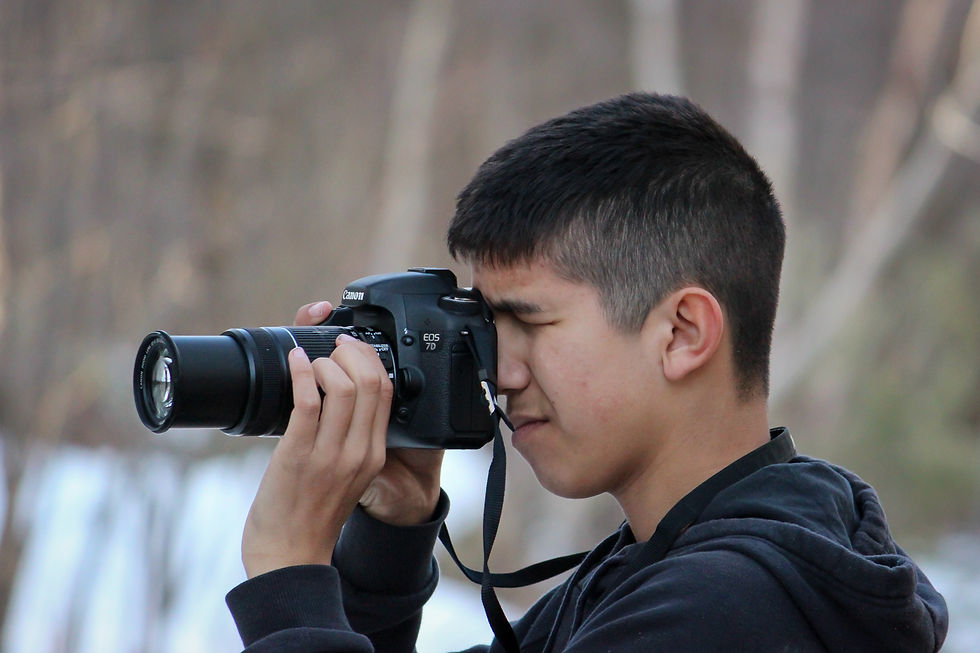The use of therapeutic photography with mental health and addictions
- Dre Erwin
- Nov 10, 2019
- 3 min read

When it comes to mental health problems, say depression and anxiety, most of what is offered are responses to the problems such as medications, support, and counselling. We look at getting verbal help when we deal with things like depression or anxiety. But most often, we are left after wondering "now what!?"
"If I didn’t find out about you guys I would probably be doing cuts on my arms and I would be probably still in my depression putting myself down,"
-Keara Tinker, youth photographer.

There are so many reasons why photography can be therapeutic.
Photography can be used as a way of expressing yourself with the use of a camera. Without even saying a word, people can take pictures to express their emotions and feelings.

Youth are encouraged to go outside, connect with nature and get physical exercise. "I love going outside and exploring, looking for things to take pictures of," Tinker. They come to the club, meet new people, make new friends and bonds with others. "It feels like our own little family" Louis Iron, youth photographer. Photographs often allow positive feedback from others, which can be huge when going through depression or dealing with anxiety. "Kids share their pictures on social media, they get likes and messages from people all over the country," Dre Erwin, President of the Pinehouse Photography Club.
"Having the club and all of you support me encourages me to do more and start helping others to do the same."
-Charlene Halkett, photographer
With so many youth feeling isolated and alone especially in northern and rural communities, "having this positive feedback, something they created, is such a rewarding experience for us all", Erwin.

“Keeping your emotions all locked up is something that’s unfair to you. When you clearly know how you feel. You should say it.”
— Taylor Swift

Those that practice therapeutic photography begin to see life in a different way. "I never seen Pinehouse the way I see it now" says Angelina Ratt, youth photographer. It provides a shift in perspective (you’re literally looking through a new/different lens, often seeing the world differently).
"Photography helped me a lot in life. Before, I was going through depressing and negative thoughts all the time"
-Louis Iron
Using photography helps give people a positive focus. It begins to help, especially youth, in how they perceive the world around them. Youth practice focusing through the lens, say to get a clear or sharp picture, eventually they begin to apply this technique to everyday life. "The more you look for beauty, the more you practice looking for the perfect shot, the more you see in even without the camera in front of your face," Dre Erwin, President of the Pinehouse Photography Club. Focusing through the camera leads to "increased ability to focus in your life and focus on what positive things that you want in your life. "It is the law of attraction" Erwin.

"What you think of the most is what you will attract,"
-Erwin

When youth begin practicing this, they begin to always looks for beauty and the perfect shot, "wherever they are and whatever they are doing, they begin to focus on what is good in life, and no so much on what is bad or maybe what happened in the past" Erwin.
"A man is but the product of his thoughts. What he thinks he becomes." – Gandhi
Photography acts as non-verbal communication, which can be huge when dealing with issues like depression or anxiety that are hindered by stigma. "So many of our youth have never talked about thoughts of suicide or depression with anyone before. This is so enlightening to see how photography opens the door to talking about your thoughts and feelings" Erwin. Youth begin expressing themselves through their pictures, a perfect opportunity for self expression and reflection. "We ask youth questions like 'what inspired you to take these pictures; how do they make you feel and what were you thinking and feelings when you took them; how do you want others to feel when they see them.'' Erwin.

Therapeutic photography also works like a form of meditation for the youth. It provides them like a “flow” state with photography, but often it simply helps youth to focus externally — rather than getting caught up in the thoughts racing through their mind.
"Photography was my escape from the pain I was going through. Whenever I was having a bad day, I knew I could always go to my camera"
-Chris Triffo, Wavelength Director

Photography can be a connection to your subconscious mind, helping youth to discover powerful personal insights about the cause behind their depression. Often the answers we seek externally are found within us.
For more information, you can contact the PPC here or visit their Facebook group.

